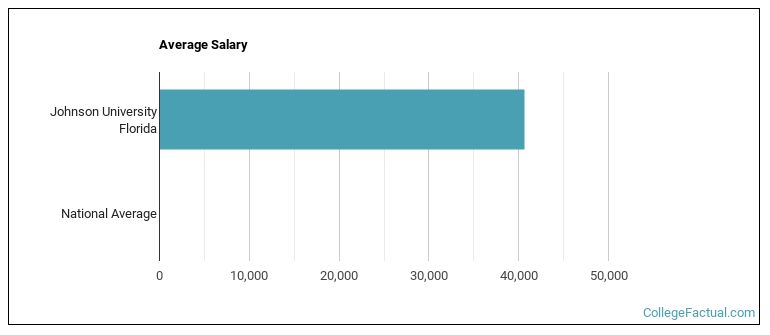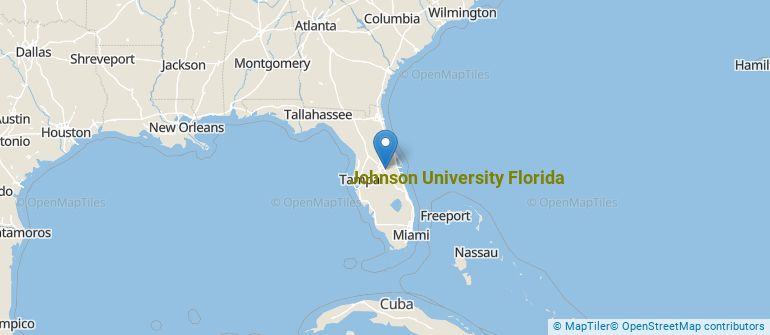 by our College Data Analytics Team
by our College Data Analytics TeamCollege Factual recognizes the best colleges and universities in its annual rankings. These rankings include categories for best overall colleges, best colleges for each major, best value schools, and much more.
Johnson University Florida was awarded 4 badges in the 2025 rankings. The highest ranked major at the school is theology & religious vocations.
Explore the best ranked schools for the programs you are most interested in.
JUFL was not ranked in College Factual's 2025 Best Overall Colleges report. This could be for a number of reasons, including lack of data.
When it comes to admittance, Johnson University Florida is somewhat selective. Its acceptance rate is 79%, which means you'll face some strong competition during the admissions process. Do what you can to make your application stand out.
About 67% of students accepted to JUFL submitted their SAT scores. When looking at the 25th through the 75th percentile, SAT Evidence-Based Reading and Writing scores ranged between 450 and 550. Math scores were between 420 and 490.
The student to faculty ratio is often used to measure the number of teaching resources that a college or university offers its students. The national average for this metric is 15 to 1, but at JUFL it is much better at 10 to 1. That's good news for students who want to interact more on a personal level with their teachers.
In addition to the student to faculty ratio, some people look at what percentage of faculty members are full-time as a sign of how much time professors will be able to spend with their students. This is because part-time teachers may not be be on campus as much as their full-time counterparts.
The full-time faculty percentage at Johnson University Florida is 100%. This is higher than the national average of 47%.
The freshmen retention rate is a measure of what percentage of first-year, full-time students come back for their sophomore year. The 48% rate at Johnson University Florida is a good bit lower than the national rate of 68%. This could be for a number of reasons, such as students transferring after a year because they changed majors.
When it comes to finishing their studies on time, those seeking a bachelor's degree from JUFL have a four-year graduation rate of 31%. This is comparable to the national average of 33.3%
Find out more about the retention and graduation rates at Johnson University Florida.
During the 2017-2018 academic year, there were 160 undergraduates at JUFL with 150 being full-time and 10 being part-time.
| $0-30 K | $30K-48K | $48-75 | $75-110K | $110K + |
|---|---|---|---|---|
| $17,366 | $19,483 | $19,141 | $26,777 | $26,692 |
The net price is calculated by adding tuition, room, board and other costs and subtracting financial aid.Note that the net price is typically less than the published for a school. For more information on the sticker price of JUFL, see our tuition and fees and room and board pages.
Almost 66% of college students who graduated with the class of 2018 took out student loans, but that percentage varies from school to school. At JUFL, approximately 65% of students took out student loans averaging $7,255 a year. That adds up to $29,020 over four years for those students.
Get more details about paying for Johnson University Florida.

See which majors at Johnson University Florida make the most money.
Get more details about the location of Johnson University Florida.

Contact details for JUFL are given below.
| Contact Details | |
|---|---|
| Address: | 1011 Bill Beck Blvd, Kissimmee, FL 34744 |
| Phone: | 407-847-8966 |
| Website: | johnsonu.edu/ |
| Twitter: | https://twitter.com/JohnsonUniv |
| Most Popular Majors | Bachelor’s Degrees | Average Salary of Graduates |
|---|---|---|
| Biblical Studies | 26 | $32,078 |
| General Psychology | 10 | NA |
| Theological & Ministerial Studies | 6 | $33,627 |
| Business Administration & Management | 3 | $30,767 |
| Liberal Arts General Studies | 3 | NA |
| Missionary Studies | 3 | $28,103 |
| Sacred Music | 3 | NA |
| Health & Physical Education | 2 | NA |
| Public Relations & Advertising | 1 | NA |
| Teacher Education Grade Specific | 1 | NA |
Online learning options are becoming more and more popular at American colleges and universities. Online classes are great for students who have busy schedules or for those who just want to study on their own time.
In 2022-2023, 69 students took at least one online class at Johnson University Florida. This is an increase from the 46 students who took online classes the previous year.
| Year | Took at Least One Online Class | Took All Classes Online |
|---|---|---|
| 2022-2023 | 69 | 4 |
| 2021-2022 | 46 | 2 |
| 2020-2021 | 31 | 0 |
| 2018-2019 | 40 | 0 |
Learn more about online learning at Johnson University Florida.
Footnotes
*The racial-ethnic minorities count is calculated by taking the total number of students and subtracting white students, international students, and students whose race/ethnicity was unknown. This number is then divided by the total number of students at the school to obtain the racial-ethnic minorities percentage.
References
More about our data sources and methodologies.